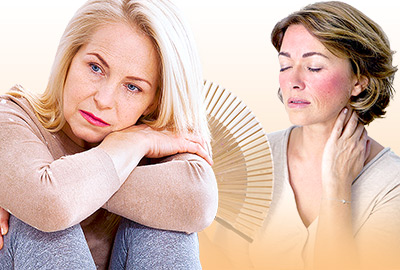
The hormonal fluctuations accompanying menopause can lead to a variety of symptoms. Symptoms can range from mild to severe, and affect your daily life adversely. If you feel that your symptoms are significantly inferring with your life, talk to a doctor. Continue reading to learn more about the emotional symptoms of menopause.
What Are the Most Common Emotional Symptoms of Menopause?
Some women have described the emotional ups and downs of menopause as being similar to a constant case of PMS. This could be because both PMS and menopause involve significant hormonal fluctuations. Declining estrogen levels can cause the following emotional symptoms:

- Loss of libido
- Mood swings
- Anxiety
- Panic
- Depression
There are a variety of other, physiological symptoms that can also be brought on by menopause, including night sweats, hot flashes, and vaginal dryness, to name a few.
How Can Emotional Symptoms Lead to Physical Symptoms?

Some emotional menopause symptoms can lead to other physical symptoms, like fatigue. For instance, severe anxiety could lead to insomnia, which could lead to fatigue the next day. Of course, it goes the other way too. Vaginal dryness can lead to painful sex and a loss of libido. The more menopausal symptoms you have, the more are created as a side effect.
What Are the Treatment Options?
The treatment options for the emotional symptoms of menopause depend on which symptoms you are experiencing. For anxiety, taking more time to relax and wind down after work may be needed, while for loss of libido, you may need to indulge in more foreplay.

When there is a chain reaction of symptoms, for example, night sweats cause you to wake up frequently at night, which in turn causes fatigue during the day, which makes you more prone to irritation and mood swings. In such cases, it's important to target the symptom at the core. There are a variety of herbal remedies that can help night sweats, as well as dietary changes that can help you avoid them, such as taking out caffeine, alcohol, and spicy foods from your diet.
In general, all symptoms can be reduced by a healthy diet where you get all the necessary vitamins and nutrients your body needs to function in daily life. Regular exercise, staying hydrated, and not smoking can all help balance hormones.
More Information
Finding the right treatment for your symptoms is essential for optimum health. If you are ever concerned about your symptoms, talk to a doctor.
Sources
- BMJ Group. "Menopause: What is it?" Patient Leaflet. 2007.
- Hopkins, Virginia. Lee, John R. M.D. What Your Doctor May Not Tell You About Menopause. New York: Warner Books Inc., 1996.
- Love, Susan M.D. Menopause and Hormone Book. New York: Three Rivers Press, 2003.
- Martin, Raquel. The Estrogen Alternative. Rochester, VT: Healing Arts Press, 2000.



